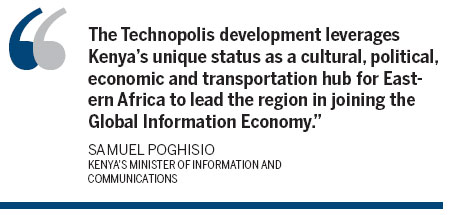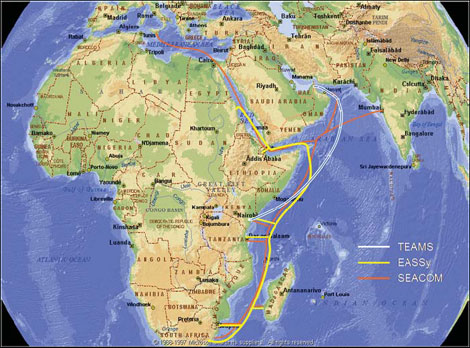News
Major ICT initiatives connect Kenya to the world
(China Daily)
Updated: 2010-05-03 07:13
 |
Large Medium Small |
|
A billion-dollar fiber optic project is facilitating more widespread connectivity across Kenya. |
|
Increased ICT use in Kenya's schools offer students modern skills they need. |
Investment and expertise sought to bring Kenya further into the information age
Removing the barriers of time and distance, Information and Communications Technology (ICT) is a powerful tool to accelerate both social cohesion and economic development, while increasing productivity across all sectors, including finance, agriculture, manufacturing and tourism.
Worldwide, the modern knowledge economy has created new and powerful industries in manufacturing, development of applications, service delivery, and research and development, and as such, Kenya is making sure ICT will play a key role in the country's development.
The Kenyan government has initiated some major steps to bridge the digital divide, lower the cost of telecommunications, and promote the use of ICT throughout the country.
As well as introducing innovative, on-the-ground schemes such as mobile banking for rural communities, the government has identified wider areas of ICT that will receive specific attention to cement the country's vision of becoming a regional technology hub.
Minister of Information and Technology, Samuel Lesuron Poghisio has pledged to level the playing field within the country through the development and implementation of policy and regulations in order to attract keener investment.
"Information is recognized as a resource which must be generated, collected, organized, leveraged, secured and preserved for national prosperity," he said.
With this in mind, the Kenyan government acknowledges the potential of ICT to help grow a knowledge-based economy, and has developed the ICT Sector Plan to enable its people, and outside investors, to get involved. The Plan, based on Kenya's Vision 2030, will see the implementation of four major programs: business process outsourcing (BPO), national ICT infrastructure, e-government strategy and the development of local digital content.
Under Vision 2030, ICT will be a major contributor to attaining the target of a 10 percent GDP growth rate by 2012 - it is currently 3 percent -and sustaining an average 10 percent growth rate thereafter.
BPO has been identified as the flagship project for the sector. However, for it to yield the expected outcomes, other enabling projects must be put in place.
The BPO sub-sector has been targeted to increase its contribution to the country's gross domestic product in the medium term by $300 millon, while creating more than 7,500 jobs for young professionals.
21st century city

Situated 60 km outside of Nairobi, Malili will be the site of Kenya's first smart city, a city built for technology firms that will propel Kenya into the global ICT arena.
The Kenyan equivalent of Silicon Valley, the Malili Technopolis is a technology business park project developed under the Ministry of Information and Communication aimed at transforming the Kenyan economy using IT-enabled services (ITES) by the year 2030.
The technopolis will host a BPO park, a financial district, a science park, a world-class convention center, a mega mall and several hotels. It will also have schools, hospitals and other recreational facilities, plus a high-speed train link to Jomo Kenyatta International Airport that will take just 11 minutes.
Minister Poghisio said: "This development leverages Kenya's unique status as a cultural, political, economic and transportation hub for Eastern Africa to lead the region in joining the Global Information Economy."
Around the world, technology parks have become the norm for research-industry interactions and for stimulating growth of technologically intensive, knowledge-based businesses. They also facilitate links between research and industrial communities, often working with local businesses and scientific faculties of universities.
The Kenyan government is committed to building modern, off-site infrastructure and a techno village, with high quality housing, infrastructure and public services, health and education, transport links and commercial space.
It will be structuring innovative PPP transaction models to share risk and return between the public and private sector developers, with public underwriting in the initial years.
Growth within the smart city will be driven by BPO, software development, data centers, disaster recovery centers, call centers and light assembly manufacturing.
Minister Poghisio explained how Kenya will provide a favorable environment for investors keen to be involved in the scheme. "A comprehensive set of incentives is being designed and implemented to improve the attractiveness of Kenya as a BPO destination. This will include tailored incentive packages for target companies," he said.
The government is also endeavoring to improve the business environment, including the ease of obtaining licenses, filing tax returns and obtaining economic justice to lower transaction costs.
A "one-stop shop" for all investor needs (licensing and recruiting) will be housed within the technology park. The Minister said: "The park will link and provide infrastructure support to small and medium enterprises, and educational and research institutions.
"Information technology export-oriented businesses are also expected to benefit from the park through tax incentives from the government. In order to attract private participation, we are likely to offer concessions on land to those willing to construct IT offices there and some tax incentives on utility services such as water and electricity."
ICT sector plan
Kenya's ICT Sector plan is based on the national priorities of poverty reduction, infrastructure development, trade promotion and industrial development as outlined in Vision 2030.
To be consistent with these priorities, the sector has harmonized its activities in the plan and will be guided by both the existing and the new policy and legal frameworks to re-engineer the rapid growth of the ICT sector. The plan serves as a foundation for the current and future development of the sector.
For ICT to be the main economic driver, this sector will work closely with other sectors whose services contribute to its outcomes to ensure that all projects and programs are implemented successfully.
The resources needed to propel this booming sector still further include highly educated/skilled human resources, a society with a culture of ICT use, good supporting infrastructure and well-funded research and development investments to ensure sustained growth. The government, meanwhile, is continuing to implement projects and policies to ensure continued growth.
Kenya's high cost electricity and low supply remain a challenge, although huge efforts are being made in the energy sector to rectify this.
BPO/ITES industry
As global corporations continue to reap the cost and productivity gains of outsourcing their call centers, data management networks and other technologies, emerging markets such as Kenya are in prime position to capitalize.
Since licensing its first call center in 2004, the number of BPOs in Kenya has grown to 62, demonstrating investor-confidence in the sector.
Launched in 2005, Nairobi-based Kencall was the country's first indigenous international call center, and now serves a wide range of clients in the US, Europe, Kenya, and Tanzania. Its world-class facility, cutting-edge technologies and professional staff of university graduates have all contributed to Kencall's success as the company of choice for numerous telecommunications, banking, credit reporting and management, medical, media and insurance firms.
Kenya's BPO/ITES industry is particularly attractive to investors due to the many skilled laborers in the market who are cost efficient compared to other African and Asian destinations.
"These sectors, which require large bandwidth and high-speed connectivity, will drive development and further growth of the economy," Minister Poghisio said.
World-class connectivity

For the sector to really thrive and reach its full potential, Kenya's connectivity has to be up to speed. Thanks to the fruition of major infrastructural projects in the last year, the country now boasts a state-of-the-art ICT landscape, and is reaping the benefits.
All three of Kenya's fiber-optic live international cables-The East Africa Marine System, (TEAMS), SEACOM and EASSy-have been installed, ensuring optimal connectivity.
The TEAMS project was born from a joint venture with the United Arab Emirates (UAE) to lay a submarine cable system at a cost of $130 million. The cable connects the Port of Mombasa to the Port of Fujairah in UAE.
The project was set rolling via a Memorandum of Understanding entered into in late 2006 between Telkom the incumbent fixed network operator in Kenya and Etisalat, its counterpart in the UAE.
Permanent Secretary in the Ministry of Information and Communications, Bitange Ndemo, the driving force behind TEAMS, said: "The cable has rejuvenated the country by enhancing ICT uptake, which will in turn transform Kenya into a competitive and knowledge-based economy."
The National Optic Fiber Backbone Infrastructure (NOFBI) Network Project complements the TEAMS, SeaCom and EASSy projects by ensuring maximum utilization of capacity through connectivity to all districts in the country.
The project was executed by a company known as Fiber Optic Backbone National Network (FONN), which was established through the Companies Act at a cost of $63.3 million.
The installation of the revolutionary underwater cable and the other fiber optic projects means prices for connectivity have been dropping, thus closing the gap between Kenya and its competitors and raising the profile of the industry on a global scale. It is already attracting back office operational work, while medium-sized call centers, such as Horizon Call Center and Ken Tech Data, are growing in number.
"This connectivity will ensure universal access to ICT, the enhancement of Kenya's economic competitiveness, and improve Kenya's learning opportunities," Minister Poghisio said.
ICT incentives
In the meantime, the Kenyan government continues to tempt investors with attractive incentives to further grow the industry. Reduced income tax for both expatriates and key national employees, as well as corporate tax holidays for BPO/ITES firms, have all won major investments.
There are also exemptions on customs duties for ICT equipment and VAT exemptions for the local purchase of key inputs.
For BPO providers, the Ministry of Information and Communications offers simplified recruitment, expedited business set-ups, and training program subsidies. Discounts on rent in BPO-specific locations are also available, and the latest technologies continually sought.
"We need local content," Ndemo said. "We need to link universities, colleges and schools for on-line e-learning and applications.
"As well as education, I believe regional political, economic and social integration can only be achieved with a harmonized ICT policy.
"We must work together in a way that promotes regional cooperation and cross-border trade."
|
International fiber optic cables have given Kenya's ICT environment a considerable boost. |

(China Daily 05/03/2010 page18)










